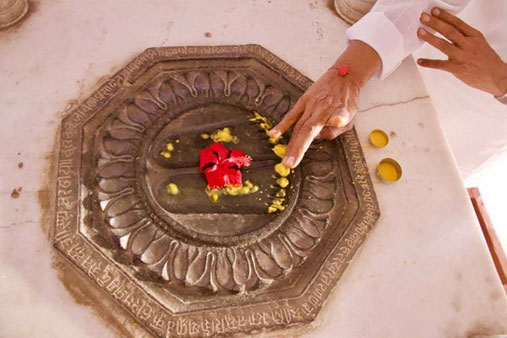Jainavenue is a medium to serve the spiritual path of Jainism

A Jain Shravak (layman) performs pooja on the representation of a Tirthankar’s footprints. Such engravings are often found at or around the location where the Tirthankar experienced a Kalyanak, or major life event.
Once, a great fire ravaged the city of Shauripuri. The villagers, fearing for their lives, ran from their homes in search of safety. They noticed Suvrat Sheth, a devout Shravak (Jain layman), was still inside his house, meditating; some of the villagers ran inside to warn him but were met by silence. Suvrat Sheth did not respond to their frantic calls, nor did he give any indication that he was worried by the fire. It was then that the villagers remembered that it was Maun Ekadashi. Each year on this day, Suvrat Sheth would take Paushad (the temporary practice of ascetic life) and complete Upvas (refrain from eating). When the fire started, Suvrat Sheth was practicing Maun — he had taken a vow to refrain from speech and focus on uplifting his soul.
After the fire subsided, the villagers returned to the city and were astonished that Suvrat Sheth’s house had not been touched by the fire. They were inspired by Suvrat Sheth’s steadfastness and decided to observe Maun Ekadashi by his example.
Such a scenario seems unimaginable to us — how can someone completely ignore the chaos around them? Although Suvrat Sheth was unharmed in the end, there was no guarantee of his safety during the fire. Why was he not afraid? The answer lies in the depth of Suvrat Sheth’s Maun. Maun is not simply silence of speech and thought. At its core, Maun is the silence of Raag (attraction) and Dvesh (aversion). Raag and Dvesh are the two strongest forces in our lives that push and pull us away from our inner peace, our equilibrium. When our attachments are threatened, we work frantically to protect them. When disturbances enter our lives, we desperately try to avoid them. Most times, we are powerless to prevent these events, and our vain efforts only exacerbate our discontent. Making an effort to silence these reactions is the truest, deepest definition of Maun, and this is what Suvrat Sheth practiced during his life. When the villagers came to alert him of the fire, he must have thought to himself, “My peace and happiness are solely dependent on myself and not on any external objects, including my body. Today, I have committed to finding true peace, and I will not be distracted from this commitment.”
The fire of the COVID-19 pandemic and its effects have engulfed our lives. Similarly, the villagers of Shauripuri lost their homes, life’s earnings, and family members. Upon seeing Suvrat Sheth’s dedication, however, they were inspired to take a Maun in hopes of gaining peace. Many of us may have experienced great loss this year, leading to unimaginable pain and thoughts of anger, worry, and hatred. In such turbulent times, we can seek and achieve some stability by taking inspiration from Suvrat Sheth.
As Suvrat Sheth’s story shows, the practice of Maun is the practice of peace and contentment. What can we do to achieve this type of Maun? First, we need to silence, or limit, our movement. The more we move and travel, the greater our chances of encountering negative environments. Second, we must silence our speech. The more we speak and interact, the more likely we are to engage our negative emotions. Finally, we can practice silencing our thoughts. Here, thoughts refer to feelings of fear, discomfort, anxiety, and the four Kashays (anger, greed, ego, deceit). This is a lifelong practice, but one that is never too late to start!
In 2020, Maun Ekadashi coincidentally falls on Christmas Day, for which many of us are given the day off. We urge you to practice Maun to the greatest degree possible for you. It is a vacation day during a pandemic. For most of us, there will be little opportunity or reason to leave our homes. Without work meetings or classes, our interactions for the day will also be greatly reduced. Use this time to give yourself the gift of Maun. You can take this vow for an hour or for the full day — whatever you are capable of. Use the time to meditate, study Jain philosophy, or reflect on your growth this year. Refrain from endlessly browsing through Netflix or scrolling through social media. The year has truly been filled with hardship and destruction for the world, and perhaps ourselves, as well. With this in mind, let us use this day to free ourselves from fear and negativity, and by doing so, even help those around us.


This article really helped me understand Maun Ekadashi. Thank you!!